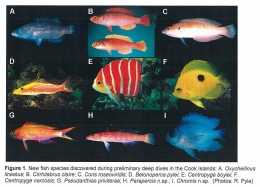HONOLULU — The Seaver Institute has awarded the Hawaiʻi Institute of Marine Biology (HIMB), School of Ocean & Earth Science and Technology at the University of Hawaiʻi at Mānoa $100,000 to fund comparative reef research at multiple Pacific locations using advanced rebreather technology. This award and the new dive technology will make it possible for researchers to study previously inaccessible sites.
"Coral reefs are among the most diverse and severely threatened ecosystems on Earth," said Jo-Ann Leong, director, HIMB. "To date reefs have been found up to a depth of at least 165 meters (m) in the Pacific, but only the upper 30 m has been studied." Leong continued, "These deeper reefs are largely unexplored because of the limits of scuba technology, so the biodiversity of more than 80% of the depth range of coral-reef habitat remains almost completely unknown. These rich coral habitats are emerging as a strong priority for management agencies and conservation organizations."
To learn more about these rich coral habitats, HIMB's research professor Brian Bowen and Richard Pyle, associate zoologist, database coordinator, and diving safety officer for the Bernice P. Bishop Museum, are embarking on a three-year study using advanced rebreather technology to discover, document and characterize deep coral reefs at three locations across the Pacific Ocean. This study complements a pilot study currently underway in Hawaiʻi. These expeditions will allow researchers to record high-definition video, collect specimens for new species documentation and various lab-based analyses, and estimate biodiversity levels.
"There are two urgent concerns about how these deep coral reefs serve coastal communities around the world," said Brian Bowen, research professor at HIMB. "First, they may be refuges that can replenish depleted fisheries and other resources in shallow reefs. Second, because these reefs operate with about 1% of surface light, coastal pollution that blocks sunlight may be lethal before we even know they exist.” Bowen concluded, "Funding from the Seaver Institute will help us document this incredible trove of unknown biodiversity, and provide momentum for research and conservation."
Please contact Lisa Ottiger at [email protected] or 956-3592 to learn more about supporting HIMB's conservation research.

# # #
The University of Hawaiʻi Foundation, a nonprofit organization, raises private funds to support the University of Hawaiʻi System. Our mission is to unite our donors' passions with the University of Hawaiʻi's aspirations to benefit the people of Hawaiʻi and beyond. We do this by raising private philanthropic support, managing private investments and nurturing donor and alumni relationships. www.uhfoundation.org
The University of Hawaiʻi at Hilo is a comprehensive university with five degree-granting colleges, six master’s programs and four doctoral programs. UH Hilo strives to integrate culture and science, offer hands-on learning opportunities to its students and use the Island of Hawaiʻi as a natural learning laboratory. Enrollment has doubled since 1980 to over 4,000 students coming from all fifty states and more than 40 countries. Please visit www.uhh.hawaii.edu.